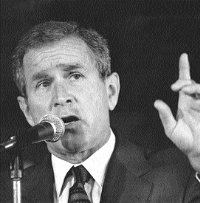George Bush brings Irish leaders to White House for St. Patrick's luncheon, assessment of dispute
President George W. Bush was using St. Patrick's Day festivities on Friday to take stock of the stalled peace process in Northern Ireland and look for ways to move it along.

Bush and other U.S. officials, including members of Congress, were gathering at the White House for lunch with Irish government leaders and Northern Ireland political figures.
The centerpiece of the event was to be Irish Prime Minister Bertie Ahern's presentation to Bush of a bowl of shamrocks, the three-leaf plant that people around the world associate with Ireland and St. Patrick's Day.
Joining him at the White House were the rival leaders of Roman Catholic opinion in the British territory of Northern Ireland: Gerry Adams, leader of the IRA-linked Sinn Fein party; and Mark Durkan, whose Social Democratic and Labor Party represents moderate Catholic opinion.
Also scheduled to attend were representatives of the major Protestant party, the Democratic Unionists, but not their fiery leader, the Rev. Ian Paisley. Reg Empey was representing the once-prominent Ulster Unionists, and Britain's secretary for Northern Ireland, Peter Hain, was on hand.
Bush last year barred all Northern Ireland leaders from the event in a bid to put pressure on Adams, whose party particularly desires support from Irish-Americans.
Administration officials said they withdrew Sinn Fein's White House invitation for the first time since 1995 because of the Irish Republican Army's admission its members killed Robert McCartney, a Catholic civilian, as well as allegations that the outlawed group stole $50 million ( Ђ 38 million) worth of British pounds from a Belfast bank.
One of McCartney's sisters, his mother and an aunt were in Washington this week for meetings with Sen. Edward Kennedy and other lawmakers. They also were expected to be attend the White House function. Last year, all five of McCartney's sisters and his fiancee were guests of the White House.
The primary aim of Northern Ireland's 1998 peace accord, a joint Catholic-Protestant administration, has remained in political limbo since 2002, when a coalition collapsed over an IRA spying scandal.
Paisley since has refused to cooperate with Sinn Fein, the biggest party in Catholic areas, until the IRA disarms and disbands. Last year, the IRA declared its 1997 cease-fire would be permanent, then handed over weapons stockpiles to disarmament officials. But the underground group has made no signal that it intends to disband.
In a speech Thursday night, Ahern said he and British Prime Minister Tony Blair have made clear they will provide the leadership to break the deadlock and revive power-sharing in Northern Ireland.
"If difficult decisions are needed to move forward, we will make them," he said.
He said he hoped that "all parties and all communities will fully accept and participate the new beginning for policing," a reference to Sinn Fein and its Catholic supporters, which refuse to work with Northern Ireland's mostly Protestant police force.
Sinn Fein boycotts a Catholic-Protestant board that is overseeing a 10-year plan for reshaping the police force, which currently requires at least 50 percent of recruits to be Catholic.
The Bush administration has said it won't allow Adams to raise funds directly in the United States until Sinn Fein takes its seats on the Northern Ireland Policing Board.
The policy means that, while Sinn Fein's U.S. fund-raising arm can collect funds from supporters, it can't do this at any events that Adams attends. Adams said this restriction meant the party had to return about $100,000 ( Ђ 80,000) collected at a Washington breakfast that the Sinn Fein chief attended Thursday.
At that event, Adams took the unusual step of publicly criticizing Bush's special envoy to Northern Ireland.
"I don't have any high regard for Mitchell Reiss' input in this process," Adams said. "If it is he who is advising the president, then it's very, very bad advice."
Standing beside him, Adams' most ardent supporter in Congress, Rep. Peter King, a Republican, also criticized the White House handling of Sinn Fein.
"I think the administration made a mistake," King said. "I don't think everyone in the White House realizes how significant decommissioning was," he said, referring to the IRA's disarmament last September.
Thursday's criticism marked the first time Adams had complained openly about a U.S. official since he started making periodic trips to the United States in 1994. Sinn Fein was expecting praise for the IRA's permanent cease-fire and disarmament moves, and Adams assumed that the Bush administration would remove its ban on him raising funds directly in the United States , reports the AP.
D.M.
Subscribe to Pravda.Ru Telegram channel, Facebook, RSS!





